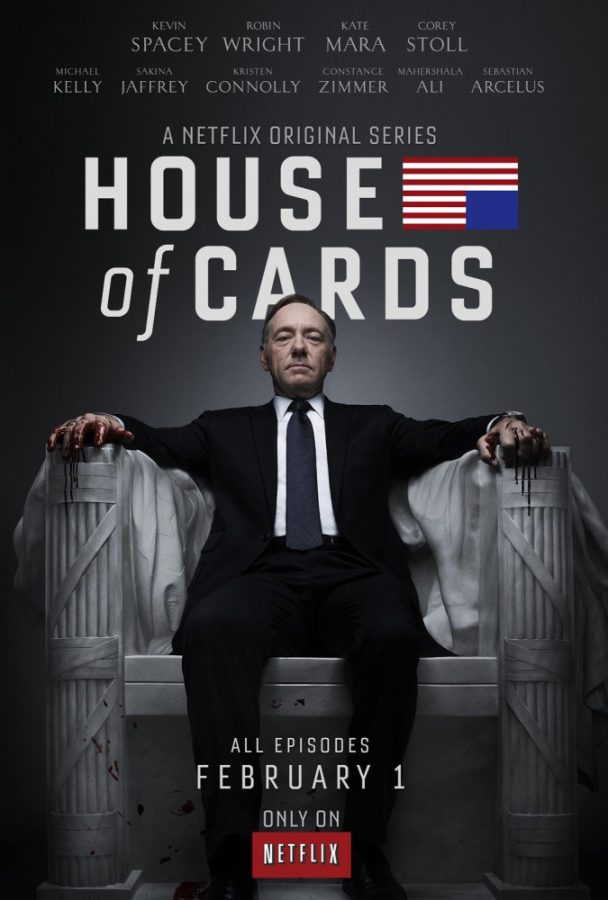Cupid has a competitor this year. His name is Frank Underwood, and his venomous political rhetoric stings far worse than an arrow through the heart.
This Valentine’s Day will witness a new type of massacre, one marked by the backstabbing tactics of the characters on the Netflix phenomenon known as “House of Cards.” Just as fans are flocking to consume all 13 new episodes of the second season, the company that holds the rights to the Emmy-winning series has already announced the renewal of the show for a third season.
For those who have yet to binge on the show’s first season, the series follows the seedy pursuits of a congressman, played by Kevin Spacey, out to steal a position of power unjustly given to someone else. His journey of retribution reflects the carefully calculated actions of a Machiavellian puppet master.
Few details have been leaked as to the conflicts lined up for Frank Underwood and his Lady Macbeth look-alike of a wife, played by Robin Wright. A two-minute preview introduced the congressman being sworn in as the new vice president of the fictional Walker administration. A series of shots then follow that suggest Underwood’s scheme is under attack, and that his behavior as a closeted demagogue is at risk of being exposed this season.
This unglamorous depiction of American politics is actually based on a trilogy of novels written by Michael Dobbs in the late 1980s. Dobbs said that he was inspired by the 1987 election of Prime Minister Margaret Thatcher and the many enemies made in her quest for reelection. The three novels were adapted into a BBC mini-series in 1990, starring Ian Richardson as Frank.
It has not been revealed how much the second season of “House of Cards” will match the second novel in Dobbs’ series, “To Play the King.” The few details that have been released are the names of some guest directors working on this season, including Academy Award-winning actress Jodie Foster and even Robin Wright, who will be directing herself in the season’s 10th episode.
Much of the success of the series is attributed to its show runner, Beau Willimon. The Oscar-nominated screenwriter got his start working on presidential campaigns. After making a career change to playwright, a script of his attracted the attention of Hollywood producers and turned into the 2011 feature film “The Ides of March,” starring George Clooney. Like “Cards,” the film displays corruption in American politics.
In a recent interview with the New York Times, Willimon said he enjoys exploring the darker side of human nature in his work.
“Anyone who’s going to like this show is not going to be the sort of person who needs to like the characters,” Willimon said in the interview.
During a free-for-all question and answer session with his more than 11,000 Twitter followers on Sunday, Willimon said that he and his production team try to keep the show authentic by doing lots of research. Underwood’s centralization of power may be more of a dramatic liberty than documented fact.
“There is a lot more uncertainty in real politics,” said Suzanne Dovi, an associate professor at the UA School of Government and Public Policy. Dovi researches the ethics of political lobbying, and says that Underwood’s ability to micromanage all of Congress is very unrealistic, due to a revolving-door pattern of power between politicians, staffers and lobbyists.
But the disintegration of unity within the two political parties makes Underwood’s opportunistic rise to power more plausible, Dovi said. Since the last century, the increased attention on individual candidates has weakened the influence of the party itself.
“Party leadership no longer has control over individual representatives,” Dovi said.
Although a card-carrying member of the Democratic Party, Underwood’s tactics are uncharacteristic of either party. The show is able to appeal to a broad audience since it doesn’t play on stereotypical presumptions of political caricatures, but rather develops a three-dimensional antihero who could rival any of William Shakespeare’s flawed protagonists.
Underwood’s fight for power is expected to draw a large number of streamers this weekend on Netflix. Only time will tell if Underwood will be able to seduce viewers with his cool, Southern drawl for a second season in a row.









